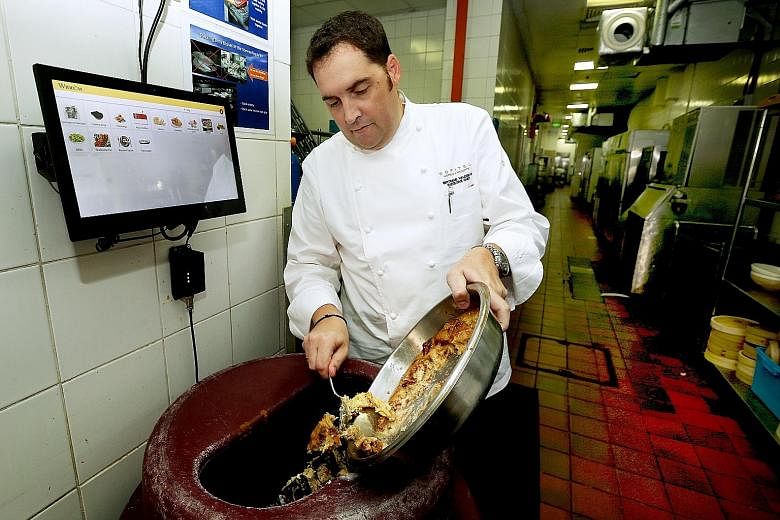One-third of the food produced globally, or 1.3 billion tonnes, is wasted every year, according to the Food and Agriculture Organisation of the United Nations.
In Singapore, the National Environment Agency (NEA) estimated that 790,000 tonnes of food was thrown away in 2014.
Now, one hotel here is taking steps to tackle that problem.
Sofitel Singapore Sentosa Resort & Spa has installed a smart system in one of its kitchens to monitor food waste. It is one of the first such systems deployed here.
The system was developed by Winnow Solutions, a United Kingdom-based company that took part in the Innovation Pitch at the CleanEnviro Summit Singapore 2016 earlier this month. The summit was organised by the NEA.
The Winnow System is a smart meter that is integrated with a kitchen's waste bin. It comprises a scale, an LCD panel and wireless connectivity.
Before workers throw anything away, they select the type of food using the panel. After they dispose of the food, the system automatically weighs how much has been discarded, and also calculates and displays the dollar value of the wasted food.
Sofitel executive chef Bertrand Valegas said: "Before we had this system, it was difficult to estimate what was being thrown away. Nowwe have concrete numbers so we know exactly where we are. We can also better forecast how much we need to cook, to make sure that we are not overproducing."
The system was installed in January this year in Kwee Zeen, the hotel's 230-seater international restaurant. The staff receive reports from the system every morning.
General manager Frederik Deman said the system has led to changes in the hotel's food preparation.
"For example, we used to have a bowl of scrambled eggs at the breakfast buffet, but we found that we were throwing away too much of it," he said. "After three weeks or a month, we stopped sending out the scrambled eggs, and just had a manned egg station."
Mr Deman estimated that the hotel has reduced its food waste by 2 to 4 per cent since the system was installed.
Mr Maxime Pourrat, Winnow Solutions' Asia-Pacific managing director, said that the company developed the system in order to tackle the global food-wastage problem.
"Food waste is an age-old problem in the hospitality sector. Our data shows that up to 20 per cent of the food kitchens purchase can be thrown away," he said.
"Working with over 200 kitchens, we consistently see food waste cut in half using our technology to measure and reduce waste."
He added that the system made a point of showing the dollar value of what is discarded.
"With the dollar value, it's easier to understand the cost of what is being thrown away, instead of the number of kilos. People react to money differently from the way that they would react to a weight."
Mr Deman said that Sofitel Sentosa is thinking of installing the system in the hotel's other restaurants, but he does not yet have a timeline of when this will take place.
He said of Sofitel adopting the system: "We are running a business here, so minimising waste makes economic sense as it benefits the environment and minimises our carbon footprint. It also helps us to manage our food cost and become more conscious in our daily ordering for our restaurants, particularly for breakfast and lunch buffets."


